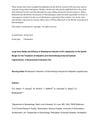Clinical Aspects, Pathogenesis, and Therapy Options of Alopecia Induced by Hormonal Therapy for Breast Cancer
October 2021
in “
Exploration of targeted anti-tumor therapy
”
hormone-receptor-positive breast cancer oncotherapy-induced alopecia female androgenic alopecia estrogenic activity dehydrotestosterone DHT hair follicles hair growth phase topical hormones oncogenic effects topical formulations minoxidil 2% cetirizine 0.5% hydrocortisone butyrate minoxidil 5% hydrocortisone butyrate 0.1% breast cancer hormonal therapy hair loss female pattern baldness estrogen hair growth topical treatments cancer-causing effects topical solutions Rogaine cetirizine hydrocortisone

TLDR Breast cancer hormone therapy can cause hair loss, which can be treated with daily applications of specific topical solutions like minoxidil and hydrocortisone butyrate.
Adjuvant hormonal therapy for hormone-receptor-positive breast cancer often results in hair loss similar to female androgenic alopecia, known as oncotherapy-induced alopecia. This hair loss, while not severe, significantly affects patients' quality of life. It is caused by the therapy's inhibition of estrogenic activity, which increases dehydrotestosterone (DHT) levels around hair follicles, shortening the hair growth phase and altering hair texture. The authors recommend against using topical hormones to treat this hair loss due to potential oncogenic effects. Instead, they suggest a treatment approach using topical formulations containing minoxidil 2%, cetirizine 0.5%, and hydrocortisone butyrate in alcohol, applied daily during the hormonal therapy. For more severe cases, or if previous female androgenic alopecia was present, a formulation of minoxidil 5% and hydrocortisone butyrate 0.1% is recommended.

















